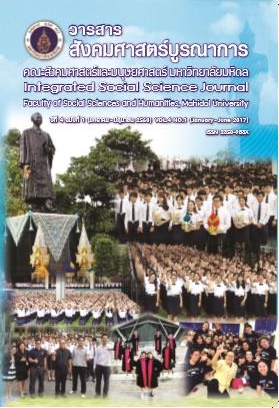Transformational Leadership in District Health Systems: Thailand’s experience
Main Article Content
บทคัดย่อ
Background: Access to healthcare in rural and remote areas in Thailand is an important element in ensuring that Universal Health Coverage is achieved. The presence of a trained and motivated health workforce in these areas is therefore an important factor for health system development in Thailand. Transformational leadership plays an important role in establishing well-performing health teams. This article draws lessons from the Thai experiences and provides evidence on the pivotal role of transformational leadership from the medical doctor, the leader the health team.
Methods: Document reviews and key informant interviews from health staffs in three provinces upcountry were performed: (1) Samutsongkram province, (2) Khon Kaen province, and (3) Tak province. Thematic analysis was applied using four components of transformational leadership.
Results: The District Health System is a primary care network in all districts in the country, serving as a firm basis for achieving Universal Health Coverage. The multidisciplinary health team consists of a wide range of health professionals, such as doctors, nurses, pharmacists, other professionals and public health officers. The function of the multidisciplinary health team involves not only facility-based health staff, but also non-professional staff, such as health care volunteers, and community residents. In the three settings studied here, health teams with a transformational leader displayed good performance in terms of (a) improving provision of a comprehensive health service package and (b) improving well being beyond health through considerations of sustainable livelihood, wealth and equity through advocating for the marginalized.
Conclusion: Commitment and transformational leadership by medical doctors, particularly those in rural areas, are key factors that help the multidisciplinary health team garner support from various stakeholders, such as NGOs and academicians for building up 'healthy' communities that go beyond good physical health and support other aspects of 'well-being' for everyone on Thai soil.
Article Details
- วารสารสังคมศาสตร์บูรณาการ มหาวิทยาลัยมหิดล อนุญาตให้สามารถนำไฟล์บทความไปใช้ประโยชน์และเผยแพร่ต่อได้ โดยอยู่ภายใต้เงื่อนไขสัญญาอนุญาต CC Attribution-NonCommercial-NoDerivatives 4.0 International (CC BY-NC-ND 4.0) โดยต้องแสดงที่มา/การอ้างอิงจากวารสาร – ไม่ใช้เพื่อการค้า – ห้ามแก้ไขดัดแปลงเนื้อหา
- ข้อความที่ปรากฏในบทความในวารสารฯ เป็นความคิดเห็นส่วนตัวของผู้เขียนแต่ละท่าน ไม่เกี่ยวข้องกับกองบรรณาธิการวารสารฯ (ซึ่งหมายรวมถึง บรรณาธิการ ผู้ทรงคุณวุฒิในกองบรรณาธิการ หรือ บรรณาธิการรับเชิญ) แต่อย่างใด ความรับผิดชอบองค์ประกอบทั้งหมดของบทความแต่ละเรื่องเป็นของผู้เขียนแต่ละท่าน หากมีความผิดพลาดใด ๆ ผู้เขียนแต่ละท่านจะรับผิดชอบบทความของตนเอง ตลอดจนความรับผิดชอบด้านเนื้อหาและการตรวจร่างบทความเป็นของผู้เขียน ไม่เกี่ยวข้องกับกองบรรณาธิการวารสารฯ
- กองบรรณาธิการขอสงวนสิทธิ์ในการตัดทอน/ปรับแก้ถ้อยคำบางประการเพื่อความเหมาะสม
References
2. De Francisco Shapovalova, N., Meguid, T. & Campbell, J. (2015). Health-care workers as agents of sustainable development. The Lancet Global Health, 3, e249-e250.
3. Herman, A. A. (2011). Community health workers and integrated primary health care teams in the 21st century. J Ambul Care Manage, 34, 354-61.
4. HFOCUS. (2015). Five years passes by: Stateless insurance, a funding for second class population? (Chapter 1). Nonthaburi: Thai Health Reform Foundation. Available: http://www.hfocus.org/content/2015/04/9809 [Accessed 14 November 2015].
5. HRDO. (2010). Pee Sue Ka Yub Peek. Nonthaburi: HRDO/Thaihealth Foundation. Available: http://resource.thaihealth.or.th/library/hot/12516 [Accessed 15 March 2016].
6. Jongudomsuk, P., Srithamrongsawat, S., Patcharanarumol, W., Limwattananon, S., Vapatanavong, P., Sawaengdee, K., et al. (2015). The Kingdom of Thailand Health System Review (Health Systems in Transition, Vol. 5 No. 5 2015), Geneva, WHO.
7. PTT Public Company Limited. (2007). The 9th Green Globe Award [Online]. Bangkok: PTT Public Company Limited. Available: http://pttinternet.pttplc.com/greenglobe/2550/personal-02.html [Accessed 6 January 2016].
8. PTT Public Company Limited. (2011). Tambon Tungpong, Ubolrat: mustering development for sustainable self reliance [Online]. Bangkok: PTT public Company Limited. Available: http://www.84tambonsforking.com/content/library/70-File2.pdf [Accessed 6 January 2016].
9. Reich, M. R., Javadi, D. & Ghaffar, A. (2016). Introduction to the Special Issue on “Effective Leadership for Health Systems”. Health Systems & Reform, 2, 171-175.
10. Robbins, B. & Davidhizar, R. (2007). Transformational leadership in health care today. Health Care Manag (Frederick), 26, 234-9.
11. Saisoonthorn, P., Uthaisin, C., Tantiwattanasub, W., Yingtaweesak, T., Somchaimongkol, S., Napaumporn, B., et al. (2015). Proposals to Public Health Minister in Mananging Rights to Public Health Care for Stateless/Nationalityless People or People with Citizenship Problems. Bangkok: Bangkok Clinic, Thammasat University.
12. Simmonds, S., Coid, J., Joseph, P., Marriott, S. & Tyrer, P. (2001). Community mental health team management in severe mental illness: a systematic review. Br J Psychiatry, 178, 497-502; discussion 503-5.
13. Tangcharoensathien, V., Limwattananon, S., Suphanchaimat, R., Patcharanarumol, W., Sawaengdee, K. & Putthasri, W. (2013). Health workforce contributions to health system development: a platform for universal health coverage. Bulletin of the World Health Organization, 91, 874-880.
14. Taplin, S. H., Foster, M. K. & Shortell, S. M. (2013). Organizational Leadership For Building Effective Health Care Teams. Annals of Family Medicine, 11, 279-281.
15. United Nations. (2015). Sustainable Development Goals [Online]. New York: United Nations. Available: http://www.un.org/sustainabledevelopment/sustainable-development-goals/ [Accessed 15 March 2016].
16. Wibulpolprasert, S. & Pengpaibon, P. (2003). Integrated strategies to tackle the inequitable distribution of doctors in Thailand: four decades of experience. Human Resources for Health, 1, 12.
17. World Health Organization. (1978). Declaration of Alma-Ata: International Conference on Primary Health Care, Alma-Ata, USSR, 6-12 September 1978 [Online]. Geneva: WHO. Available: http://www.who.int/publications/almaata_declaration_en.pdf [Accessed 15 March 2016].
18. World Health Organization. (2015). Executive Board document 138/36 Health workforce and services - Draft global strategy on human resources for health: workforce 2030 [Online]. Geneva: WHO. Available: http://apps.who.int/gb/ebwha/pdf_files/EB138/B138_36-en.pdf?ua=1 [Accessed 15 March 2016]

